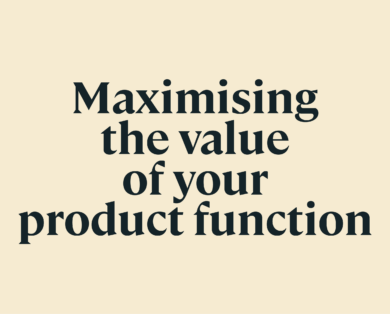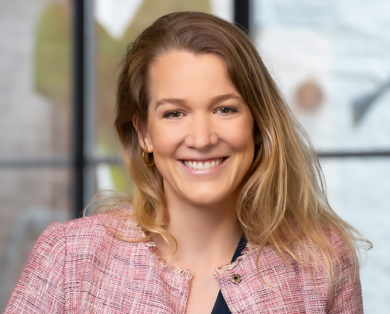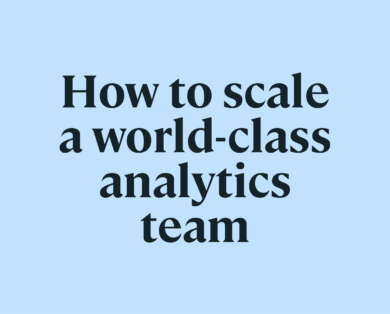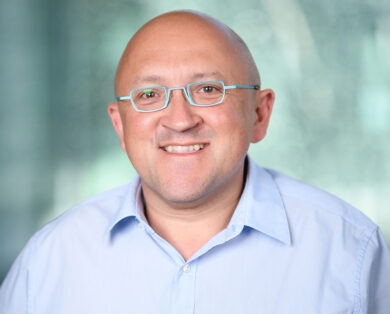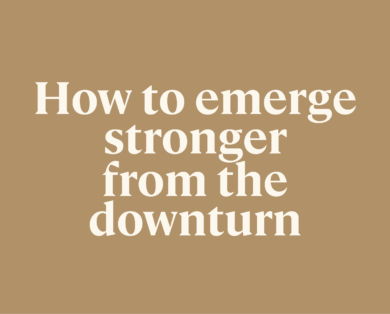- 27 February, 2024
POINT OF VIEW
In April, we gathered startup founders and friends from the tech and venture ecosystem to Balderton’s headquarters to hear from three brand experts – leaders responsible for consumer brands at Innocent Drinks, Depop and Bulb.
At Balderton, our portfolio companies correctly obsess about their brand as they grow to scale and gain millions of users. They want to know what brand means to them. How they should hold onto their brand promise during fast growth. How can they measure brand impact?This event was co-hosted by JamJar Investments and Balderton. (JamJar is an investor in Bulb. Balderton is an investor in Depop.) Here are some insights from the evening from our panellists, moderated by Isabel Bescos, who ran strategy for BlaBlaCar – joining that French-founded startup as an early employee, and scaling to millions of users, prior to joining Balderton’s investment team.
Moderator: Isabel Bescos, Balderton investment team and former head of strategy, BlaBlaCar

Panellist: Richard Reed, Partner, JamJar Investments
Innocent Founder and former co-CEO
Richard founded Innocent 20 years ago with his two best friends (still his best friends, he says!) in a market stall, and sold it 15 years later to CocaCola. He now works with high growth consumer brands at JamJar Investments.
Panellist: Peter Semple, CMO, Depop
Peter joined Depop as CMO fairly recently and was previously one of the creative minds behind global archetypal brands such as Nike, Converse and Umbro. Depop is a Balderton portfolio company, an online home for the world’s creatives to buy, sell and discover inspiring and unique things.
Panellist: Russell Davies, CMO, Bulb
Before Bulb, Russell worked with brands such as Nike, Apple & Microsoft and is also Contributing Editor at Wired Magazine.
What does brand mean to you? And what’s your brand promise?
Richard Reed, Innocent, JamJar

Brand is one of the most valuable things you have, but it’s not something you will ever own. It’s is a series of thoughts, feelings and emotions held in the minds of individuals. You want what people think about you to be what you want them to think about you. But you don’t get to control it. And you definitely don’t own it.Innocent’s strength on a good day was total congruence – for me that’s the single most important thing if a brand is going to succeed – everything you do, feel, say, make has to be consistent.While the left brain, logical component of a brand may be around core customer propositions, there is also a more invisible ‘vibe’ and emotion that comes from everyone in the business.You must ask yourselves if you are all transmitting and radiating the ‘vibe’ of the brand in a way that is completely congruent with the things you believe.At Innocent, whenever we felt challenged, we brought ourselves back to what we stood for. Keeping it simple, and natural. That’s why we called it Innocent in the first place. That’s why the product was in a bottle with natural paper packaging. That’s why the copy spoke to you in a natural way, like a human being.People are challenged in the amount of attention they have. They only care about a few things. You only have a split second to get consumer attention. If you’re a brand who is lucky enough to capture that split second of attention, you better make sure you’re clear and consistent and that you land the message clearly.
 Brand is one of the most valuable things you have, but it’s not something you will ever own.
Brand is one of the most valuable things you have, but it’s not something you will ever own.
 Brand is one of the most valuable things you have, but it’s not something you will ever own.
Brand is one of the most valuable things you have, but it’s not something you will ever own.
Richard Reed, Innocent Drinks, JamJar Investments
Russell Davies, CMO, Bulb

I’m going to be a little annoying because I think ‘brand’ is a quite unhelpful term. Because it just means so many different things to so many different people. So I try never to use it.Nonetheless, it’s important to distinguish what you mean by brand – do you mean company, reputation, logo, identity, design, service? Distinguishing what you mean is helpful.Also, I don’t think we’re ever trying to scale a brand. We’re trying to scale a business. You can get a brilliant brand from a brilliant business. You can’t necessarily get a brilliant business from a brilliant brand.You must start with the business – get the service right, the product right, the communications right, the identity right and you end up with a great brand.At Bulb, we don’t think about a brand promise. What we do have is the promise that our business will deliver affordable, renewable energy that’s simpler, cheaper and greener. Then we communicate that in a way that’s friendly, nice and funny when it needs to be, and serious when it needs to be, we end up with an interesting brand.I see a lot of the tools ‘sold’ by branding consultants or branding agencies were ones that evolved to help undifferentiated business differentiate themselves through design. They evolved to make you pay more for one product over another, even though the products are identical – to make you pay more for a McVitie’s biscuit over a Sainsbury’s biscuit. That’s useful in an undifferentiated market, where you’re scrambling for half a percent of share in the supermarket aisle. But if you have a better product, and better service, focus on that and the brand will follow. Don’t start with the brand.
 You can get a brilliant brand from a brilliant business. You can’t necessarily get a brilliant business from a brilliant brand.
You can get a brilliant brand from a brilliant business. You can’t necessarily get a brilliant business from a brilliant brand.
 You can get a brilliant brand from a brilliant business. You can’t necessarily get a brilliant business from a brilliant brand.
You can get a brilliant brand from a brilliant business. You can’t necessarily get a brilliant business from a brilliant brand.
Russell Davies, Bulb
Peter Semple, CMO, Depop

For me, brand comes down to the role you’re trying to play in people’s lives. You can’t separate the brand and the business. You must ensure that you’re all aligned on the common vernacular internally, and everyone is clear on how you’re communicating who you are, and then what you share about your business needs to be simple, and clearly and easily communicated. Because the further away from you the message is shared, the harder it is to control. You must keep it simple and sharp.Before creating Depop, the founder (Simon Beckerman) had previously founded a youth culture magazine in Italy. He wanted to build an e-commerce platform to sell products from the young creatives he featured in the magazine – and he wanted it to be social marketplace, which was quite a unique idea at the time in 2011. The way Depop has evolved since then has been thanks to a series of good ideas, all focused on youth culture and fashion.Somewhere around 90% of our users are under the age of 26, so they’re very young, very engaged, and very sharing led. And a lot of our success has been around recognizing them and reaffirming our commitment to them as young fashion entrepreneurs as they build their businesses.Most of our growth has been largely organic, but as we’ve grown the fundamental story hasn’t changed – that is, social commerce for youth creativity.But now it’s also evolved because our community displays the best attributes of the social values of the future. Our community are the ones that are literally changing and reshaping culture all around them. So inclusion and diversity comes as a standard. Commitment to sustainable practices comes as a standard. And those things are now part of who we are at Depop, because we’re the platform on which this community lives and everything we do is in service of them.So we now have an opportunity to lean into those things, and champion those things, and celebrate them more, and they’ve become integral to our brand story today.
 Brand comes down to the role you’re trying to play in people’s lives. You can’t separate the brand and the business.
Brand comes down to the role you’re trying to play in people’s lives. You can’t separate the brand and the business.
 Brand comes down to the role you’re trying to play in people’s lives. You can’t separate the brand and the business.
Brand comes down to the role you’re trying to play in people’s lives. You can’t separate the brand and the business.
Peter Semple, CMO, Depop
To what extent can brand be a competitive advantage?
Russell Davies, CMO, Bulb
At Bulb, my job, and my team’s job, is less about the brand, and more about how we can tell as many people about the Bulb service as possible. We’re just the icing on the cake. It’s the cake that matters. The cake is the 200 incredibly talented people who answer the phones at Bulb. It’s about the design of the service, and the fact that it’s affordable and renewable.When you’re too brand-led, it can lead you into distractions. For example, depending on who you asked at Nike, and when you asked them, you’d get a different answer to the question of what is Nike’s mission. When I was there it was “bring inspiration and innovation to every athlete in the world.” (Asterisk – if you have a body, you’re an athlete.) That’s definitely their mission, and everyone goes to work to do that, and deliver that.But they also sell millions of graphic t-shirts with a swoosh on it. Is that delivering innovation and inspiration to an athlete? No, not really. But no one worries about it. No one tries to square that circle. The brand stuff is useful and interesting and important, but they don’t let it run everything.The brand workshop process can grind the life out of anything interesting and innovative. It’s more interesting to ask how you can make the service or the product better, and a good brand comes out of that.
 The brand workshop process can grind the life out of anything interesting and innovative. It’s more interesting to ask how you can make the service or the product better, and a good brand comes out of that.
The brand workshop process can grind the life out of anything interesting and innovative. It’s more interesting to ask how you can make the service or the product better, and a good brand comes out of that.
 The brand workshop process can grind the life out of anything interesting and innovative. It’s more interesting to ask how you can make the service or the product better, and a good brand comes out of that.
The brand workshop process can grind the life out of anything interesting and innovative. It’s more interesting to ask how you can make the service or the product better, and a good brand comes out of that.
Russell Davies, CMO, Bulb
Richard Reed, Innocent, JamJar
I worked in advertising for many years, so I recognize what Russell is saying. If you have a dancing monkey in your tea-bag ad, it’s because your tea-bag is the same as everyone else’s tea-bag. If you’re a CMO, and you have a product that isn’t differentiated and you’re told to find a way to appear differentiated, it’s a false instruction.Instead, your job is to find a way to make your product differentiated and find some material reason why the customer is going to get something more out of your product. And it can be the smallest thing. It doesn’t have to be a fundamental step change – which is great, but much harder – it can be a small change that really makes a difference.I can point to an example of this at Innocent. We sold orange juice in cartons. And Tropicana sold their juice in cartons. At the same price. And while our research universally told us that people would buy our orange juice, hardly anyone did. The problem was that it was undifferentiated. It was all basically orange juice.In FMCG, 50% is what’s inside, and 50% is what’s on the outside.Two years later, we bought the same orange juice back in what we called a carafe (a posh word for a bottle). It looked nicer. The right brain was drawn towards it. You wanted to pick it up. It was nicer to have on the table. The large cap meant older people, and children, could open and close it more easily. It was essentially a fairly simple set of changes, to what was the same product we tried to sell in a carton. But it went on to sell twenty times the volume of the orange juice in a carton.I wish I could say it was something other than “just” the package that caused the change. But at least it was a real and objective change that delivered extra benefit.We have always thought that 95% of your marketing strategy is the thing itself – the product or service – and 5% is what Russell calls the icing. It’s great when it’s done well and it can be incredibly energizing. But don’t let it distract you from focusing on the product – how is your product or service meaningfully better for the consumer in the way that they consider relevant, compared to the competition. You have got to be thinking about that.Today as an investor, we look to identify teams that obsess about this sort of thing. Too much of it may be bad, but it’s far worse to have none of it at all. You must have someone in the business who disproportionately cares about the product and keeps going back to the making the thing itself better.
 95% of your marketing strategy is the thing itself – the product or service – and 5% the icing. It’s great when it’s done well and it can be incredibly energizing. But don’t let it distract you from focusing on the product.
95% of your marketing strategy is the thing itself – the product or service – and 5% the icing. It’s great when it’s done well and it can be incredibly energizing. But don’t let it distract you from focusing on the product.
 95% of your marketing strategy is the thing itself – the product or service – and 5% the icing. It’s great when it’s done well and it can be incredibly energizing. But don’t let it distract you from focusing on the product.
95% of your marketing strategy is the thing itself – the product or service – and 5% the icing. It’s great when it’s done well and it can be incredibly energizing. But don’t let it distract you from focusing on the product.
Richard Reed, JamJar, Innocent Drinks
Peter Semple, CMO, Depop
This question reminds me of what my brilliant mentor at Google in Google Labs advised us what we should focus on:Understand the magic that Google is capable of – with tens of thousands of the smartest people in the world working at Google.Then know the user and deeply understand what people want and what’s happening in the world.Then connect the two together.And that was literally our mission statement for our Creative Lab group. And we didn’t want to add anything further because we didn’t want to limit ourselves in any way.Today, I am bringing that thinking to my new team at Depop – know the magic, and know the user. Just because we’re in marketing doesn’t mean that we’re just creating marketing assets. We’re always revisiting the product, and we’re looking for ways to help make our product more meaningful and useful.
 Know the magic. Know the user. Connect the two.
Know the magic. Know the user. Connect the two.
 Know the magic. Know the user. Connect the two.
Know the magic. Know the user. Connect the two.
Peter Semple, CMO, Depop
What’s your example of a company doing brand really well?
Richard Reed, JamJar Investments, Innocent Drinks
Nigel Farage is an example of a great brand!Look at the effectiveness of that one person! While his politics are not my politics, the effectiveness of himself as one person – a brand – is clear. And what it comes to at the end of the day, is that he really means it. He really, really believes deeply, on a cellular level, what he’s saying. And that helps him cut through. He also uses the language of brands – even though he might deny it.He communicates at an emotional level. He’s the bloke talking sense down the pub. He’s a brilliant brand manager of himself. So while I don’t necessarily approve of what he says, I do respect how he’s gone about it and what we can learn from him.It reminds me of the best advice I’ve ever been given in how to communicate to get noticed. It’s about simplification, and then it’s about exaggeration. That’s what great brands do. You boil it down to a few simple, single words that represent what it is you stand for. And then you use all the tools to dramatize and exaggerate.
 The best advice I’ve ever been given in how to communicate to get noticed – it’s about simplification, and then it’s about exaggeration.
The best advice I’ve ever been given in how to communicate to get noticed – it’s about simplification, and then it’s about exaggeration.
 The best advice I’ve ever been given in how to communicate to get noticed – it’s about simplification, and then it’s about exaggeration.
The best advice I’ve ever been given in how to communicate to get noticed – it’s about simplification, and then it’s about exaggeration.
